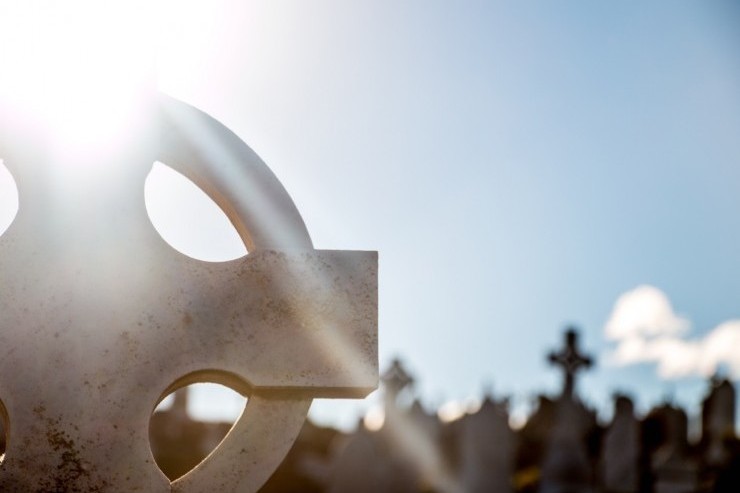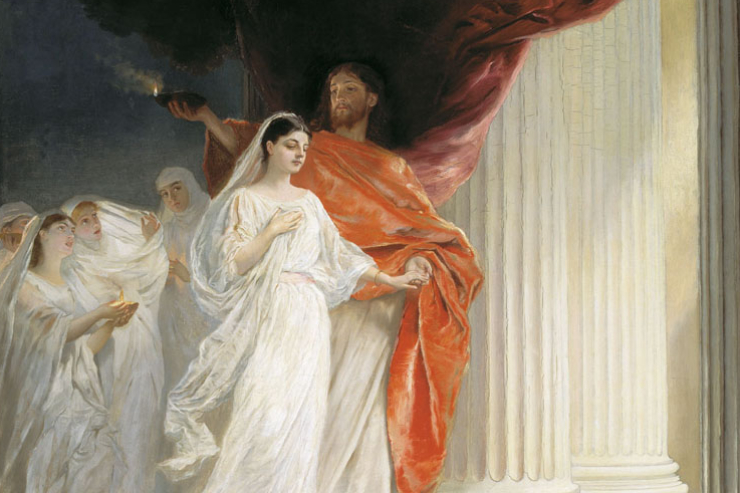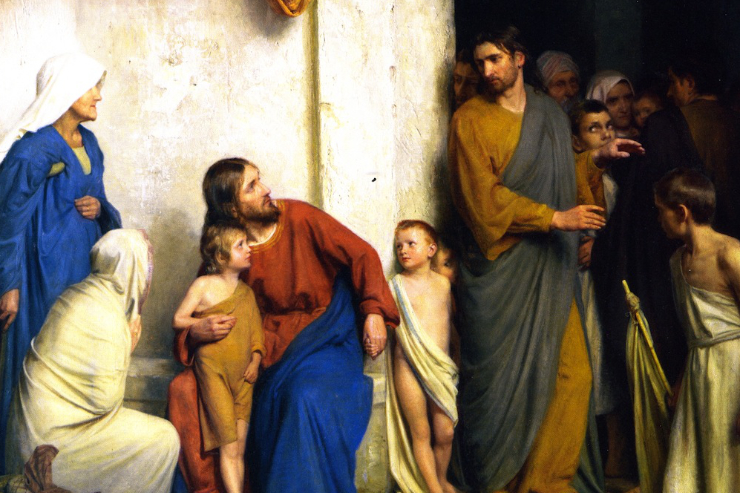“We must face the reality of death to fully understand it, and we must understand it in order to more fully live.”
November is the month of the poor souls in purgatory. We can obtain a plenary indulgence for someone in purgatory during the first eight days of November. The indulgence is obtained, under the usual conditions, by anyone who “on any and each day from November 1 to 8, devoutly visit a cemetery and pray, if only mentally, for the departed.” (Enchiridion of Indulgences, 1999) Yet we must not forget about them for the rest of the month… or the rest of the year.
For some of us in North America, we experience a season change that may aid our prayer during this time. As winter approaches, things around us die. As I eluded to last week, meditation on death is an important part of our spiritual life. We need to be reminding ourselves that we don’t live for this world, but the next. Thinking about our death isn’t macabre, but rather a vital exercise in our attempt to live the Christian life.
It is one reason I love cemeteries. It’s hard to visit a cemetery and walk among the headstones and not begin to think about our own death. Am I ready? Am I’m living with eternity in mind?
I have mixed feelings about mausoleums. To be clear, there is nothing wrong with mausoleums, and I know they can be the best (or only) option for some people. I hadn’t experienced a mausoleum until my grandfather died. While it wasn’t the first time I experienced a funeral of a grandparent, it was the first time I stood inside a building to watch a burial. And I’ll be honest- it was strange. In fact, I had to leave and walk outside.
There was something odd about mourning in a sterile, staged environment. The armchairs in the hallway, the Catholic muzak piped throughout the rooms, the coldness of the air-conditioning in the Indiana summer. Everything was thought through to be perfect– comforting and pleasant to grieving families. So it wasn’t. It was as if the world was telling me, “It’s okay. We’re here for you,” … in that fake smiley sort of way that reeks of superficiality.
It wasn’t okay. My grandfather had died. I didn’t need any fake sentiment, and I certainly didn’t need to hear Be Not Afraid ala dentist’s waiting-room.
To clarify, this is to say nothing against that particular cemetery/mausoleum. I don’t doubt that sincere, well-intentioned people work there and I’m sure they would never want to convey a mere superficial attitude toward grieving families. It was the mausoleum environment itself against which my insides rebelled at that moment.
I stood facing the reality of death, and the raw feelings inside of me did not want to be soothed by an attempt to mask the reality. They sought the tumultuous, unrestrained surroundings of creation.
I wanted to stand in the elements of nature – the grass under my feet, the wind against my tear-streaked face- and watch my grandfather’s casket go into the earth.
Death is real. It faces us all. And I think the more we try to whitewash the reality, the harder it is to accept. Remember, man, that you are dust, and to dust you shall return.
Our society, this culture that John Paul II named ‘the culture of death,’ fears death. It fears anything that causes suffering or discomfort. Our culture condones assisted suicide — not because it really believes in “good death,” but because it can’t stand to face something it cannot control. Through assisted suicide, man can control what he fears most.
The Christian does not fear death, because the Christian knows it has been conquered in the cross of Christ. Christ’s death on the Cross meant that death was no longer an affliction, but a victory. Only the culture that understands death and embraces it for what it is– a return to the Creator and an embrace of what man was made for– can fully live.
Even with this understanding, however, facing the reality of death is a heart-wrenching act. Because we were created to live forever, the separation of the soul from the body is something we naturally fear and seek to avoid. The Second Vatican Council document Gaudium et spes reminds us that man “rebels against death because he bears in himself an eternal seed which cannot be reduced to sheer matter” (n. 18).
Even your faith and hope cannot erase the natural pain you feel at someone’s death. In his Confessions, St. Augustine writes about his feelings at the death of his mother Monica. His full understanding of heaven and the nature of death did not change the grief his heart felt.
“We felt it was not fitting that her funeral should be solemnized with moaning and weeping and lamentation, for so it is normal to weep when death is seen as sheer misery or complete extinction. But she had not died miserably, nor did she wholly die. Of the one thing we were sure by reason of her character, of the other by the reality of our faith. What then was it that grieved my heart so deeply?”
Augustine finally accepts that grief is a natural emotion in response to death. He observes, “Because I had now lost the great comfort of her, my soul was wounded and my very life torn asunder, for it had been one life made of hers and mine together.” He eventually let himself weep. “Now I let flow the tears which I had held back so that they ran as freely as they wished. My heart rested upon them, and it reclined upon them because it was Your ears that were there, not those of some human critic who would put a proud interpretation on my weeping.”
The Christian grieves and rejoices at the same time. These two contrary emotions were reconciled to each other on Good Friday, as our Blessed Mother stood and watched her Son conquer.
The one who fears death cannot rejoice in it. And the one who does not embrace death cannot grieve. We must face the reality of death to fully understand it, and we must understand it in order to more fully live.
Cemeteries lie overgrown and unvisited, for our world would rather not be reminded of their own mortality. If we’re going to be reminded of it, at least let the surroundings be comfortable—staged and sterile—so it’s a little less disconcerting. We don’t want to think about our bodies being dropped into the cold earth.
We need to visit mausoleums and cemeteries more often. It should be our practice as Christians, and not just in November. Look at the names, one by one, of the people who may be complete strangers to you. Pray for them. And ask them to pray for you.
Remember, man, that you are dust, and to dust you shall return.
Go forth, Christian soul, from this world
in the name of God the almighty Father,
who created you,
in the name of Jesus Christ, the Son of the living God,
who suffered for you,
in the name of the Holy Spirit,
who was poured out upon you.
Go forth, faithful Christian!May you live in peace this day,
may your home be with God in Zion,
with Mary, the virgin Mother of God,
with Joseph, and all the angels and saints. . . .May you return to [your Creator]
who formed you from the dust of the earth.
May holy Mary, the angels, and all the saints
come to meet you as you go forth from this life. . . .
May you see your Redeemer face to face.-Prayer of Commendation
Please share this post on Facebook and other social media below:















